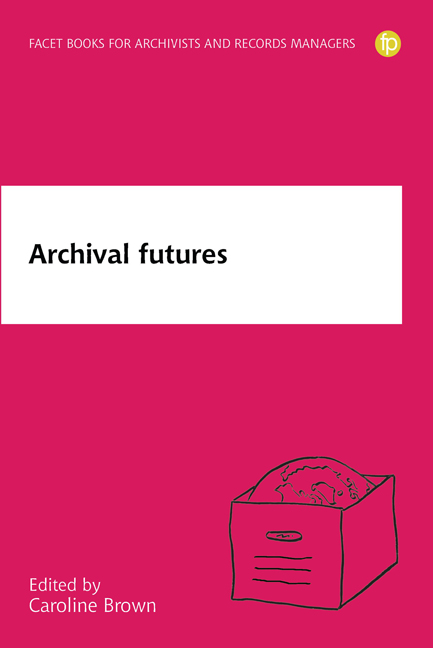Book contents
- Frontmatter
- Dedication
- Contents
- Notes on contributors
- Introduction
- 1 It's the end of the archival profession as we know it, and I feel fine
- 2 Whose truth? Records and archives as evidence in the era of post-truth and disinformation
- 3 The future of archives as networked, decentralised, autonomous and global
- 4 Can we keep everything? The future of appraisal in a world of digital profusion
- 5 Frames and the future of archival processing
- 6 Access technologies for the disruptive digital archive
- 7 Multiple rights in records: the role of recordkeeping informatics
- 8 The accidental archive
- 9 The end of archival ideas?
- Index
2 - Whose truth? Records and archives as evidence in the era of post-truth and disinformation
Published online by Cambridge University Press: 01 June 2019
- Frontmatter
- Dedication
- Contents
- Notes on contributors
- Introduction
- 1 It's the end of the archival profession as we know it, and I feel fine
- 2 Whose truth? Records and archives as evidence in the era of post-truth and disinformation
- 3 The future of archives as networked, decentralised, autonomous and global
- 4 Can we keep everything? The future of appraisal in a world of digital profusion
- 5 Frames and the future of archival processing
- 6 Access technologies for the disruptive digital archive
- 7 Multiple rights in records: the role of recordkeeping informatics
- 8 The accidental archive
- 9 The end of archival ideas?
- Index
Summary
Introduction
In 2016, the Oxford English Dictionary chose the term ‘post-truth’ as its Word of the Year, an adjective that it defined as ‘relating to or denoting circumstances in which objective facts are less influential in shaping public opinion than appeals to emotion and personal belief’ (Oxford English Dictionary, 2016). The term, coined in 1992, has risen in use since the 2016 European Union referendum in the United Kingdom and the United States’ presidential election. It relates to a rise of anti-intellectualism that is undermining faith in the professional integrity of all knowledge fields and in the value and authority of records and archives as sources.
Although very ‘of the moment’, the phenomenon exemplified by the notion of post-truth is not new. Richard Hofstadter's book Antiintellectualism in American Life discusses the phenomenon in 1963 (Lemann, 2014). In addition, intelligence agencies the world over have been using tactics of disinformation – information that is incorrect by design – for decades, as shown by Cobain's narration of the systematic destruction of records perpetrated by the British when leaving their colonies (Cobain, 2016).
A similar phenomenon, identified in 1995 by Robert Proctor, is the deliberate propagation of ignorance. Proctor called its study ‘agnotology’, from agnosis, the neoclassical Greek word for ignorance or ‘not knowing,’ and ontology, the branch of metaphysics that deals with the nature of being. Agnotology is the study of wilful acts aimed to spread confusion and deceit (Kenyon, 2016). In the past, these phenomena have been tempered through the mediation exercised by professionals responsible for curating ‘the truth’ – such as journalists, historians and archivists – which has often, though not always (see Cobain, 2016), succeeded in balancing disinformation and misin - formation, or information that is incorrect by mistake, with an accurate revelation of facts.
What has changed in the digital age is the prevalence of a continuous connectivity that lets falsehoods (be they by mistake or by design) circulate at rates unimaginable only a few decades ago. This is combined with the pervasiveness of distribution channels that tend to sidetrack traditional institutions – such as archives, libraries and museums – in favour of a populism where reputation as a trusted source no longer carries much, if any, weight, though a few are calling policy makers to action (Council of Europe, Committee on Culture, Science, Education and Media, 2017).
- Type
- Chapter
- Information
- Archival Futures , pp. 19 - 32Publisher: FacetPrint publication year: 2018
- 1
- Cited by



